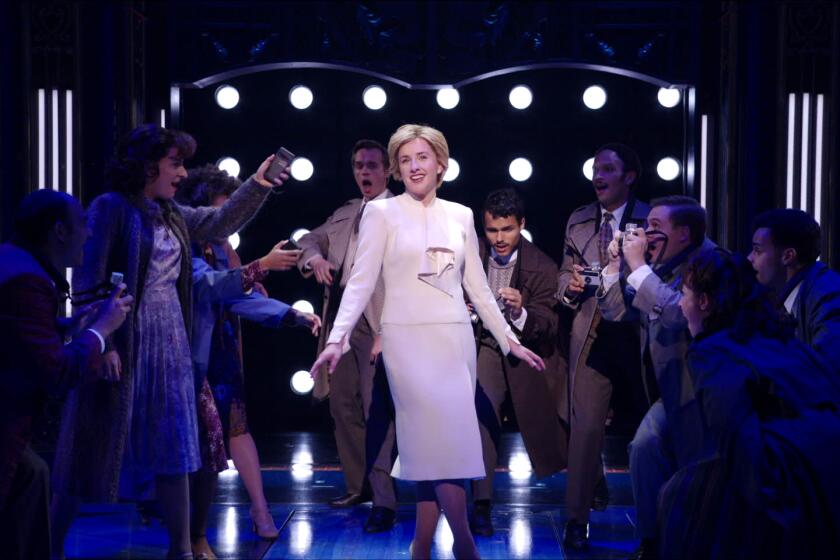Review: At South Coast Rep, ‘A Shot Rang Out’ proves to be an eloquent misfire

- Share via
Characters in Richard Greenberg’s plays tend to unburden themselves in spoken arias. Long theatrical monologues are their staple, full of verbal curlicues, erudite allusions and pent-up fury.
These are urbane speakers, highly educated, and steeped in the arts if not artists themselves. In Greenberg’s Tony Award-winning “Take Me Out,” Denis O’Hare, playing a lonely and eccentric gay man who discovers in baseball the meaning of American democracy,
delivers a paean to America’s pastime that tempted audiences to stop the show with a standing ovation at the breathless end of his oratorical home run.
A certain type of actor thrives in these prolix circumstances. My introduction to Greenberg’s style came, thankfully, via the fluent Peter Frechette in the Broadway production of “Eastern Standard.” My appreciation deepened after seeing John Slattery, Patricia Clarkson and Bradley Whitford in Manhattan Theatre Club’s crisply articulate production of “Three Days of Rain.”
South Coast Repertory, long an artistic home for Greenberg, commissioned and originally produced “Three Days of Rain.” “A Shot Rang Out: A Play in One Man,” a new solo work that opened over the weekend at the theater’s Segerstrom Stage, marks the 13th of his plays to be produced at SCR, a remarkable 10 of which (including this one) have been world premieres.
This extended monologue, which takes the form of a loose-jointed academic talk, was written expressly for SCR’s artistic director, David Ivers, to perform. Greenberg was engaged by Ivers to write a play at the onset of the pandemic that could be presented, virtually or in-person, depending on epidemiological conditions.
A review of Jennifer Holliday’s concert ‘Here’s To Life’ at the Wallis Annenberg Center for the Performing Arts
Written with Greenberg’s customary eloquence, the work reflects the uncertainty of its commission. “A Shot Rang Out” feels like a Zoom play that has been given the green light by public health authorities for theatrical presentation. Except for the visual flourish that concludes the production, the piece might work better as a podcast drama.
Yet being back in the theater is the context for this quasi lecture by John, a thespian with a capital T. The premise is that this middle-aged actor has been granted, much like Greenberg, a gig of his own devising during this soft relaunch of live performance.
“Do that thing you’ve always dreamed of doing,” John recalls being told with a shudder. Creative freedom can be harrowing. But the result is a curious little address he’s titled “In Praise of Lesser Things.”
Popular rather than high culture is what’s on John’s mind because it’s how he managed to make it through what he calls his “confinement.” He alludes to a “catastrophe” “of unprecedented scope,” of which no one was “exempt.” But the pandemic isn’t specified or dwelled upon.
John’s woes, like most of ours, predate the protracted crisis du jour. Marriage is his topic, but before delving into his own situation, he offers some lively thoughts on two old movies that began as plays, “The Seven Year Itch” and “Any Wednesday.”
No one has to remind him that these are not cinematic works of the highest order. But it’s their entertaining mediocrity that he finds so enlightening.
“Diana: The Musical,” about the ill-starred royal marriage, is streaming ahead of its Broadway opening. There’s a reason for that.
In particular, he’s fascinated with the assumptions they reveal about marriage. “The Seven Year Itch,” Billy Wilder’s 1955 film that has been immortalized for the image of Marilyn Monroe standing on a subway grate with her white dress billowing in all directions, places an erotic dream before a man whose married life has settled into slumberous routine.
The message that domesticated passion inevitably grows stale is one of the lessons that John draws from the movie. But the more important one, embodied in the sensual relief Marilyn finds in the cooling subway gust, is that if our pleasures inevitably fade, so too do our sweltering problems.
“Any Wednesday,” the 1966 screen version of Muriel Resnik’s play about a woman (Jane Fonda) in love with a married lout, suggests to John a different moral about marital unions. Could a husband and wife who have discovered the unflattering truth about their relationship find a way to regenerate the old magic?
That’s the possibility that John wants to impart to us, an image of ambiguous hope, symbolized in “Any Wednesday” as a bouquet of helium-filled balloons. His own marital story isn’t the stuff of romantic comedy. Indeed, it might be more in keeping with the darker works of August Strindberg, Anton Chekhov and Samuel Beckett, all of whom John drolly promises to steer clear of.
“A Shot Rang Out,” directed by Tony Taccone, has exquisite prose cadences, droll semantic distinctions and finely observed cultural and psychological insights. But the play is held back by two significant problems.
The first is the way Ivers’ performance accentuates the artificial tone of the writing. John, a perpetually performing ham, is flawed as a man and unreliable as a narrator. But instead of allowing us time to discover the character’s deficiencies, Ivers exaggerates them with pretentious intonation and artsy mannerisms.
Why would any artistic director give this guy carte blanche to reopen a theater? Unless perhaps the point was to expose the actor as cipher. But couldn’t we stay home for that?
For the play to work, the character needs to be more theatrically seductive, which is to say more credible. In my experience, the phoniest actors are masters of sincerity. The archness of Ivers’ portrayal smacks of a provincial acting teacher who has been relegated to performing in dusty college classrooms and on supermarket lines.
The other issue, endemic in Greenberg’s playwriting, is the overly abstract nature of the thematic design. Like so many of his plays, “A Shot Rang Out” is constructed along parallel nuances that might architecturally serve a Henry James novel but lack the material sturdiness to support a satisfying drama. It’s not a question of subtlety, which the stage can accommodate, but obliquity, which feels like an evasion of theater’s confrontational power.
As ever, it’s a pleasure to experience Greenberg’s deft choreography of words. But as a play inaugurating the return of in-person performance, “A Shot Rang Out” fires a blank.
‘A Shot Rang Out: A Play in One Man’
Where: South Coast Repertory, 655 Town Center Drive, Costa Mesa
When: 7:30 p.m. Wednesdays and Thursdays, 8 p.m. Fridays, 2:30 and 8 p.m. Saturdays, 2 p.m. Sundays; ends Nov. 6
Tickets: $33-$93
Info: (714) 708-5555 or scr.org
Running time: 1 hour, 25 minutes
More to Read
The biggest entertainment stories
Get our big stories about Hollywood, film, television, music, arts, culture and more right in your inbox as soon as they publish.
You may occasionally receive promotional content from the Los Angeles Times.













